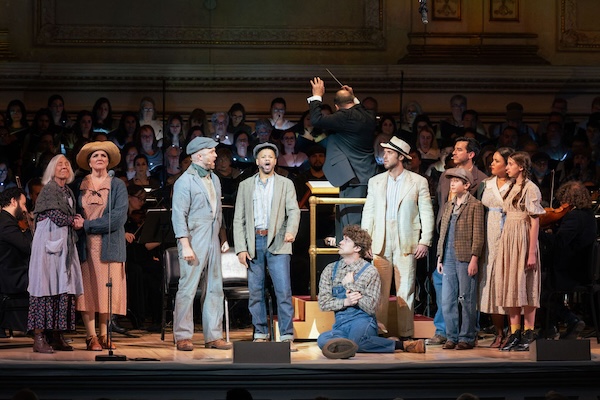MasterVoices’ superb cast provides fine advocacy for Gordon’s “Grapes of Wrath”

Spectacular forces crammed the Carnegie Hall stage Wednesday night: there was the Orchestra of St. Luke’s, the 130 or so members of MasterVoices Chorus, and close to twenty principal performers. There were projections of nature images and famous photographs on the back wall.
All of these elements, led by conductor Ted Sperling, came together for a concert performance of Ricky Ian Gordon’s 2007 opera The Grapes of Wrath, an adaptation of John Steinbeck’s classic novel of the Depression. It was a monumental treatment of a monumental subject, but one that on this occasion came off as less than the sum of its numerous parts.
In this story of the Joad family escaping the Dust Bowl of Oklahoma and traveling to California to find not only work but the basics of physical survival, many of these parts were quite fine. The extensive cast had strong performers like baritone Kyle Oliver as Tom Joad, mezzo-soprano Margaret Lattimore as Ma Joad, baritone Nathan Gunn as Pa Joad, and soprano Mikaela Bennett as Rose of Sharon. This was a lightly staged performance, with the principals in period costume, moving about the lip of the stage and pantomiming at times, the projections at the back evoking time and place. This concert version also cuts the original run time of about three hours down to approximately two and a half. On Wednesday actors J. Smith-Cameron and Joe Morton narrated overviews of the missing scenes.
The pleasures of this season-closing performance for MasterVoices came from that cast. Some of the vocal writing sits in an uncommitted nether place between theater and opera styles, and the singers navigated this confidently. Oliver in particular took to the part with grace and character, even as some of the music seemed just past the edge of his upper range.
This was also a challenge at times for Bennett, but the rounded glow of her soprano was compelling and an important color against orchestral textures that are often dense and monochromatic through most of this version. She concludes the opera with “Take it, Mister,” and her rendition was luminous enough to seem to float over the hall.
Pa is a mix of straight singing and more parlando style, and Gunn was a natural for this, with the naturalism he brings to his performances as Papageno. Lattimore had such substance and center to her singing that every time she was featured, the entire performance seemed to coalesce around what the character had to say. And one of the most powerful moments of the night came from the smaller role of baritone Malcolm MacKenzie as Uncle John, singing “Little Dead Moses.” It was a visceral performance, MacKenzie holding to pitches and phrases while pressing at the edge of yelling and crying.
Lattimore had the most emotional weight and complexity of the evening, which provided balance against orchestral music that was too much in the same emotional tone, slightly elegiac but muscular post-Copland Americana. The Grapes of Wrath is full of horrors, and the concert version lost some of the most powerful moments to narration. While scenes like “Dry Blue Night,” as the Joads cross the Mojave desert and experience both life and death, could be beautiful, complex, and moving, this version limited the emotional range and depth of the overall opera.
The horrible moment when Noah (a fine bass-baritone Christian Pursell) decides to drown himself so the Joads will have an easier time surviving is set to rising major chords modulating to one major key after another. In a larger context of music full of conflict this might have had more resonance.
The singers were miked, which gave them a chance to move easily about the stage, but also had the effect of making their voices, coming through the speakers, sound like they were in a different room then the orchestra. This was perhaps a necessity so they could compete with the sheer volume of sound behind them. That sonority was massive and at times thrilling, especially the wonderful conglomeration of the MasterVoices and their energy, but also so dense that it erased many key details. The orchestration has important roles for harmonica and banjo, yet both were almost impossible to hear under Sperling’s direction. Except when isolated to small groups of musicians, dance rhythms were sluggish.
In this opera, Gordon and librettist Michael Korie also radically alter the larger implications of what The Grapes of Wrath is about. The concert version comes across as melodramatic in the extreme, even maudlin at times, leaving out almost all the personal and societal conflict. The Joad family saga is of course melodramatic, personal, and affecting, but it’s more than a family surviving circumstance and acts of God—the story is unabashedly about the dignity and work of labor, and the malevolent depredations of capitalism and bigotry.
It is also a crypto-Christian tale of the human value of migrants and the poor. Having this version water them down so much reduces the important and wrenching conflict in the novel to a token acknowledgement that something bad happened. Woody Guthrie did this all much better, more honestly and powerfully, and at a fraction of the duration.